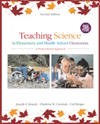 |  Teaching Children Science: A Project-Based Approach, 2/e Joe Krajcik,
University of Michigan - Ann Arbor
Charlene Czerniak,
University of Toledo
Carl Berger,
University of Michigan - Ann Arbor
What Is a Driving Question?
Definitions| contextualization | Anchoring questions in the lives of learners and creating them to deal with important, real-world questions.
|  |  |  | | driving question | A question that organizes and drives the diverse activities of a project.
|  |  |  | | ethical | Scientific moral conduct that is not harmful to living organisms or the environment.
|  |  |  | | feasibility | Driving questions that can be carried out by students to perform investigations and are developmentally appropriate.
|  |  |  | | meaning | Interesting and exciting to learners.
|  |  |  | | project-based science | A teaching approach that engages young learners in exploring important and meaningful questions through a process of investigation and collaboration. Throughout this dynamic process, students ask questions, make predictions, design investigations, collect and analyze data, make products, and share ideas. As a result, students learn fundamental science concepts and principles that they apply to their daily lives.
|  |  |  | | subquestions | Students' own questions related to the driving question.
|  |  |  | | sustainability | A topic that can be studied or maintained over time.
|  |  |  | | worth | Questions that have value as rich science content and process that match district curriculum standards.
|
|



 2003 McGraw-Hill Higher Education
2003 McGraw-Hill Higher Education